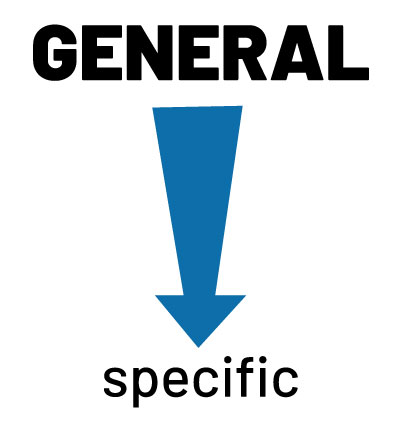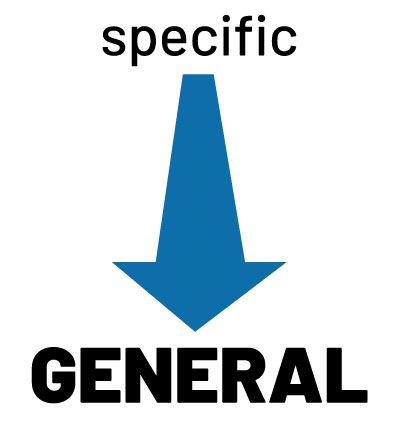Deductive and Inductive Logic
Arguments take two basic forms—deductive (general to specific) and inductive (specific to general). Each has its uses, and they work best in tandem.
Deductive Reasoning

A deductive argument begins with a general rule and moves toward a specific case. If all premises are true (even hidden assumptions) and all inferences are correctly derived, a deductive argument can guarantee its conclusion.
General Premise: All mice are rodents.
General Premise: All rodents have teeth for gnawing.
Specific Premise: Walter is my pet mouse.
Specific Conclusion: Walter has teeth for gnawing.
If the three premises are true, and the conclusion is properly derived, then the conclusion must be true. However, one might argue with the second premise, saying old mice might lose their teeth for gnawing, and if Walter is one such mouse, the conclusion is false.
In the next example, the premises must be true and the inference and conclusion must be properly derived for the whole argument to be true.
General Premise: Every catalog from our company must be approved by the marketing director.
Specific Premise: The spring catalog from our company shipped in January.
Specific Inference: The spring catalog was approved by the marketing director.
Specific Premise: Jim DeMarco has been marketing director for the last three years.
Specific Conclusion: Marketing Director Jim DeMarco approved the spring catalog.
Note that if one of the premises is untrue, or if an inference or conclusion is not properly derived, the conclusion may be untrue. For example, suppose that Jim DeMarco was hospitalized from November to December and left the catalog in the hands of his able assistant. Then the general premise is untrue—a catalog can be approved by a person designated by the marketing director.
Deductive Reasoning
Using Deductive Reasoning
A deductive argument can guarantee its conclusion as long as the premises and hidden assumptions are true and the inferences and conclusion are properly derived. You can string deductive arguments together by using the conclusion of one argument as a premise in another.
The problem with deductive arguments is that the conclusions are contained within the premises. The argument can’t cover new ground. When you reason from general principles to a specific case, you learn about one case. To discover general principles, you have to use inductive reasoning.
Inductive Reasoning

An inductive argument starts with specific cases and derives a general rule. If the specific cases broadly representative all cases, the general rule is more likely to be true than if the details are nonrepresentative. As a result, inductive arguments cannot guarantee their conclusions—which must be tested to see if they apply always, sometimes, or rarely.
Specific Premise: Wisconsin borders the Mississippi River.
Specific Premise: Illinois borders the Mississippi River.
Specific Premise: Iowa borders the Mississippi River.
General Inference: Wisconsin, Illinois, and Iowa are Midwestern States.
General Conclusion: All Midwestern States border the Mississippi River.
But what about Indiana and Ohio? They are Midwestern but nowhere near the Mississippi. The premises and inference are true, but the conclusion is not true because the states mentioned do not represent all Midwestern states. With inductive reasoning, you should treat the conclusion as a hypothesis—a general principle that must be tested and adjusted: Some Midwestern states (5 out of 12) border the Mississippi River.
Inductive arguments can also use specific facts to build the case for a general opinion.
Specific Premise: Middle-class wages have remained stagnant for 40 years.
Specific Premise: The net worth of the billionaire class has grown exponentially over the same time period.
Specific Premise: The class one is born into is a stronger indicator of success than any other factor.
General Inference: The United States is no longer a meritocratic society.
General Conclusion: The federal government should come up with a plan to address income inequality.
This argument reaches a sound conclusion in the form of a policy statement (an opinion about what should be done). However, note that someone may agree with the premises and inference but suggest a different conclusion (for example, that philanthropy rather than legislation can solve the problem).
Inductive Reasoning
Using Inductive Reasoning
Inductive arguments start with specific observations and derive general conclusions, a process similar to scientific discovery. The conclusions act as hypotheses, which, when tested, can turn into theories or even laws. They also tackle complex issues that deductive arguments cannot address, arguing persuasively.
As you have learned, inductive arguments can only support their conclusions rather than proving them as fact. To do so, the conclusion must be tested further using deduction.